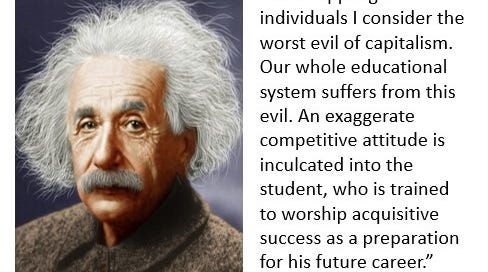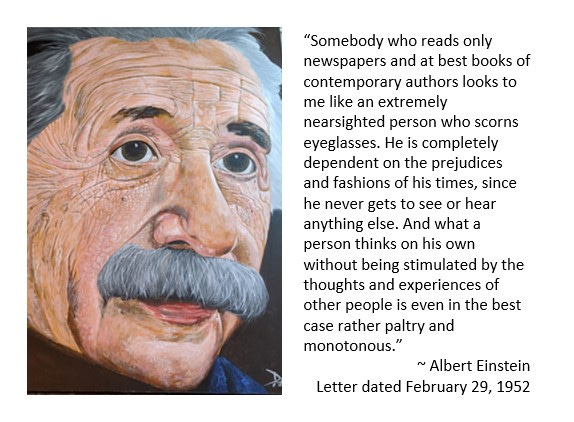Einstein on Education
Why Albert Einstein Believed Humanities were an Essential Component of a True Education
The following is an excerpt of a talk on Albert Einstein and the humanities delivered on November 26, 2023 before the Nature Coast Unitarian Universalists. Engaging with Einstein’s writing and lectures, I explained why the renowned scientist believed the humanities, with its emphasis on values and ethics, were essential to human flourishing and could not be replaced with a purely scientific worldview.
Excerpt: Einstein’s Vision of Education
Our contemporary education system urges students to take up specialized knowledge tracks earlier and earlier in their academic career, in preference over generalized curriculums rooted in the liberal arts. Albert Einstein was an early critic of what some, today, call the “cult of the head-start.” Long before high school students were expected to choose their professional trajectories before senior year and colleges tried to funnel students into career-track paths, Einstein criticized early specialization in education in favor of a strong humanistic general education.
In an October 15, 1936 speech on education, Einstein explained why he believed cultivating independent thinking skills should be prioritized.
“If a young man has trained his muscles and physical endurance by gymnastics and walking, he will later be fitted for every physical work. This is also analogous to the training of the mind and the exercising of the mental and manual skill. Thus the wit was not wrong who defined education in this way: ‘Education is that which remains, if one has forgotten everything he learned in school.’”
The “wit” Einstein had in mind may well have been Henry David Thoreau. In an 1859 journal entry, Thoreau wrote:
“It is only when we forget all our learning that we begin to know. I do not get nearer by a hair’s breadth to any natural object as long as I presume that I have an introduction to it from some learned man. to conceive of it with total apprehension I must for the thousandth time approach it as something totally strange.”
Why approach something familiar as though it were strange? Because we respect the dynamism of life. Because we recognize our intellectual limits and wish to do more than lay claim to possessing knowledge. We wish to know with aliveness, to know in the Being mode of living, as Erich Fromm would later call it. And in doing so we once more enter into sacred communion with the world and all that we wish to understand.
The rightful priority of schools should be helping students develop the “general ability for independent thinking and judgement” or “independent critical thinking,” as he would later describe it in a 1952 letter, and not promoting narrow specialization of knowledge. The person who develops their capacities to think and learn independently is “able to adapt himself to progress and changes” compared to “the person whose training principally consists in the acquiring the detailed knowledge,” as Einstein put it in “On Education.”
According to Einstein, generalizable thinking skills formed a foundation upon which any specialized interest could be built. What’s more, a failure to cultivate originality and independence of thought in schooling would foster socially damaging standardization. Einstein was particularly concerned with the United States’ schooling system emphasis on an unhealthy degree of competitiveness. He saw this as symptomatic of the pathological influence of capitalism on society. In “Why Socialism?” (1949), he wrote:
“This crippling of individuals I consider the worst evil of capitalism. Our whole educational system suffers from this evil. An exaggerate competitive attitude is inculcated into the student, who is trained to worship acquisitive success as a preparation for his future career.”
This emphasis on competitiveness diminished the individual and put the individual into an unnatural state of antagonism with the other members of his community.
Einstein warned that schools ought to avoid methods of inducing students to work that created or amplified student desires “to be acknowledged as better, stronger, or more intelligent” than their peers. In place of competitive schooling, he believed society was best served by adopting a philosophy of education centered on honoring and developing the individual, while also instilling them with a basic awareness of their social and ethical responsibilities.
“For a community of standardized individuals without personal originality and personal aims would be a poor community without possibilities for development. On the contrary, the aim must be the training of independently acting and thinking individuals who, however, see in the service of the community their highest life problem.”
Einstein believed schools could play a key role in combating conformist thought and behavior. In place of standardization and competition, we should stimulate the natural love of learning. He objected to dominant modes of schooling that alienated learners from the joys of knowledge. “The most important motive for work in the school and in life,” Einstein shared, “is the pleasure in work, pleasure in its result, and the knowledge of the value of the result to the community.”
Please share and like this post by clicking the heart icon.
Invite Dr. Nall to Speak
Dr. Nall delivers energetic live presentations and engaging workshops on the subjects featured in Humanities in Revolt. Those interested in booking a workshop or talk can get in touch through Facebook or by leaving a comment.








We seem to be on the same wavelength! My about page is literally the same. An excerpt:
"Universities have increasingly become commercialized entities, beholden to capitalistic interests, and thereby compromising genuine avenues for creation, innovation, and revolution. While students of the past generations took a stand against oppression and refused to march to war, today's students are consumed with the burden of repaying student debts. The rich heritage of education and enlightenment has - like much in this neoliberal world - been destroyed. Worse, universities once beacons of knowledge, have turned into gatekeepers of progress.
In our current landscape, possessing a university degree and adhering to the prevailing philosophy of the day—always inherently neoliberal—is necessary to gain recognition and respect: without letters after your name, you are not listened to nor respected for your thoughts and contributions on a matter, no matter how illuminating or pioneering. This is the most profound folly of our age. I would wage the wisest of individuals on Earth have never set foot in such institutions. Those with experience, wisdom, and knowledge to guide us out of the challenges we face are often found outside the confines of Western 'higher' educational corridors, ignored due to the trappings of educational prisons we put our ownselves - with the entirety of humanity - in."
Great minds and all that eh ;-)?